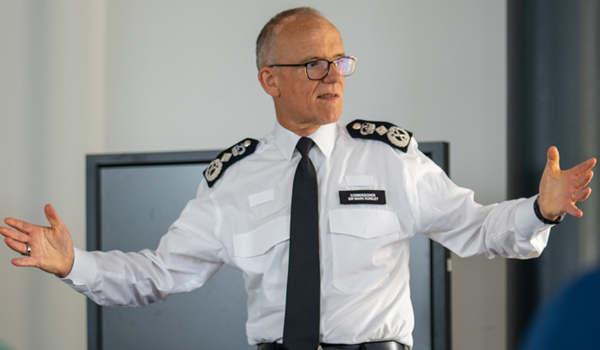MPS Commissioner warns of ‘tough choices’ due to £450m funding gap
The Metropolitan Police Federation has warned that “eye watering cuts” outlined by Commissioner Sir Mark Rowley could have “a significant impact” on policing London.
In a report to the London Policing Board on Tuesday (December 10), the Metropolitan Police Service (MPS) Commissioner said it could be forced take “tough choices to reduce the service we offer Londoners” due to a £450 million funding gap.
“The impact of these tough choices could represent a reduction of 2,300 officers policing London, along with 400 staff, having a seriously detrimental impact,” Sir Mark said.
In his report, Sir Mark said: “Delivery of policing for London is challenging, particularly given the resource constraints ahead, and the MPS and our funders have long expected a difficult financial position for 2025/26.
“In last year’s budget setting process, we identified a significant budget gap which we closed through cuts to our services, use of reserves, a reduced NMFL budget, and efficiencies. The mayor also provided additional one-off funding.
“During last year’s budget process our medium-term financial plan outlined and anticipated 2025/26 structural budget gap of £300 million.
“The gap has since grown – driven by unfunded pay increases, the reversal of non-recurrent 2024/25 savings, exhaustion of our reserves, the need to invest in our estate and the need to continue to invest in reform.
“Based on an assessment of the budget pressures agreed with the mayor, the MPS has a budget gap of £450 million between our requirement and the budget for 2025/26. This comes at a time when the demand on our services is increasing.”
In his report, Sir Mark said they had identified a “series of tough choices” they may have to implement in a worst-case scenario budget deficit. These could include:
- Scaling back the ability to tackle serious violence and organised crime by cutting the teams that proactively target some of the most harmful offenders, as well as the covert teams that support them; this includes reducing the size of the Flying Squad and removing its firearms capability, with that support coming from other armed commands.
- Significantly cutting back on the dogs unit and the mounted branch and reducing the ability to respond and proactively police incidents on our roads.
- Making cuts to the teams that help the force get ahead of criminals, track down wanted offenders, and gather vital evidence, by moving all intelligence teams into a single command and reducing their size, cutting the interceptor teams (meaning less support for the front line in targeting serious threats and potentially high-risk wanted persons remaining at large for longer), and reducing forensic services in traditional areas such as fingerprints and DNA.
- Focusing more on delivering core policing activity in London’s communities by cutting the specific teams that currently police the Royal Parks, brigading all officers that engage specifically with young Londoners in a more cost-effective way, reducing opening hours for some front counters across London, and reducing the number of investigations into historical crimes committed many years or decades ago.
Sir Mark said this is not a final list: “These are planning assumptions that will change right up until we receive our final settlement.”
He said they will also make savings by releasing more officers to where they are needed on the front line and recruiting police staff to replace them in roles that do not require warranted officers. This will include roles in intelligence teams, call centre and major investigation teams.
However, Sir Mark’s report said: “In line with our guiding principles of communities-first and frontline focused, we remain committed to building the strongest ever neighbourhood policing.
“We have therefore limited the impact of workforce reductions on the front line and will continue to invest in reforming how we fight crime locally. This includes not making any cuts to our already overstretched emergency response teams.”
He added: “We have left these decisions as late as possible to maximise time for our funders to change our budget assumptions for next year but we can’t wait any longer or it will not be possible to achieve the reductions without uncontrolled consequences. Indeed, some of these changes may need to start from January 2025.
“We have begun to build the case for further investment in policing through the upcoming multi-year Spending Review. It is only through a sustainable multi-year settlement that we can begin to meet the scale of the challenge in London.
“The necessary steps we are taking this year will allow us to operate on a sustainable basis within the financial resources available.”
Responding to Sir Mark’s comments, Matt Cane, general secretary of the Metropolitan Police Federation, said: “Policing in London is an incredibly difficult job. And it’s only set to get harder.
“As we have said time and time again, cuts have consequences. These eye watering cuts will clearly have a significant impact on the Metropolitan Police’s ability to effectively police London but also on our already overstretched members.
“They deserve better – and proper support from the country’s politicians when it comes to funding the force.”


